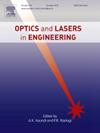Full polarimetric evaluation of the anamorphic transfer function for pixelated liquid crystal microdisplays
IF 3.5
2区 工程技术
Q2 OPTICS
引用次数: 0
Abstract
Spatial Light Modulators (SLMs) employing phase-only modulation typically rely on parallel-aligned liquid crystal on silicon (PA-LCoS) microdisplays, known for their high resolution and small pixel size. However, the performance of high-definition pixelated SLM devices is affected by various interpixel cross-talk degradation effects, that manifest differently depending on the orientation and the spatial frequency profile displayed on the microdisplay. This study explores, both experimentally and numerically, the anamorphic spatial frequency transfer function for pixelated PA-LCoS devices. In particular, we focus on the impact of high-frequency binary phase grating profiles with the grating vector parallel and perpendicular to the alignment direction defined by the alignment layer. Experiments are performed with a commercial PA-LCoS microdisplay with eight-micron size pixels. Novel full Stokes light analysis (polarimetric study) of the diffraction orders and diffraction efficiency measurements (radiometric study) provides a deep insight into the anisotropic phenomena involved, showing not only anamorphic degradation in the radiometric but also in the polarimetric performance and dependent on the applied voltage. Computed rigorous electromagnetic numerical results show a very good agreement with the experimental ones. The numerical computation is an essential tool since it enables the connection of the far-field evaluation with the microscopic level: the 3D distribution of the LC director and the near-field values of the illuminating electromagnetic field are known for each applied voltage onto the PA-LCoS microdisplay and show evidence for the anamorphic results in the far-field. Through this rigorous combined radiometric-polarimetric computing approach, we provide evidence of the impact of smaller pixel sizes in this SLM technology and for different fill-factors.
对像素化液晶微型显示器的拟态传递函数进行全面偏振评估
采用纯相位调制的空间光调制器(SLM)通常依赖于平行排列的硅基液晶(PA-LCoS)微型显示器,这种显示器以分辨率高、像素尺寸小而著称。然而,高清晰度像素化 SLM 设备的性能受到各种像素间串扰衰减效应的影响,这些效应根据微显示屏显示的方向和空间频率曲线的不同而表现各异。本研究从实验和数值两方面探讨了像素化 PA-LCoS 器件的拟态空间频率传递函数。特别是,我们重点研究了高频二元相位光栅剖面的影响,光栅矢量平行和垂直于对准层定义的对准方向。实验使用的是像素尺寸为 8 微米的商用 PA-LCoS 微型显示器。对衍射阶数和衍射效率测量(辐射度研究)进行了新颖的全斯托克斯光分析(偏振度研究),深入了解了其中涉及的各向异性现象,不仅显示了辐射度性能的非定形退化,而且还显示了偏振度性能的非定形退化,并且与施加的电压有关。严格的电磁数值计算结果与实验结果非常吻合。数值计算是一项重要工具,因为它能够将远场评估与微观层面联系起来:对于 PA-LCoS 微显示屏上的每个外加电压,LC 导向的三维分布和照明电磁场的近场值都是已知的,并且显示了远场拟态结果的证据。通过这种严格的辐射-偏振计算组合方法,我们证明了较小像素尺寸对这种 SLM 技术和不同填充系数的影响。
本文章由计算机程序翻译,如有差异,请以英文原文为准。
求助全文
约1分钟内获得全文
求助全文
来源期刊

Optics and Lasers in Engineering
工程技术-光学
CiteScore
8.90
自引率
8.70%
发文量
384
审稿时长
42 days
期刊介绍:
Optics and Lasers in Engineering aims at providing an international forum for the interchange of information on the development of optical techniques and laser technology in engineering. Emphasis is placed on contributions targeted at the practical use of methods and devices, the development and enhancement of solutions and new theoretical concepts for experimental methods.
Optics and Lasers in Engineering reflects the main areas in which optical methods are being used and developed for an engineering environment. Manuscripts should offer clear evidence of novelty and significance. Papers focusing on parameter optimization or computational issues are not suitable. Similarly, papers focussed on an application rather than the optical method fall outside the journal''s scope. The scope of the journal is defined to include the following:
-Optical Metrology-
Optical Methods for 3D visualization and virtual engineering-
Optical Techniques for Microsystems-
Imaging, Microscopy and Adaptive Optics-
Computational Imaging-
Laser methods in manufacturing-
Integrated optical and photonic sensors-
Optics and Photonics in Life Science-
Hyperspectral and spectroscopic methods-
Infrared and Terahertz techniques
 求助内容:
求助内容: 应助结果提醒方式:
应助结果提醒方式:


